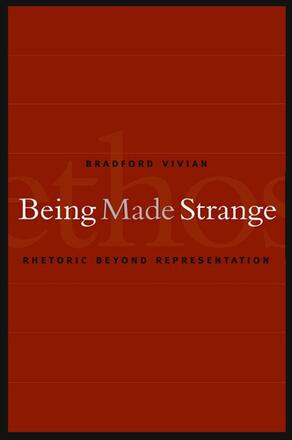
Being Made Strange
Rhetoric beyond Representation
Alternative formats available from:
Offers a revised understanding of human subjectivity that avoids the extremes of both traditional humanism and cultural relativism.
Description
By elaborating upon pivotal twentieth-century studies in language, representation, and subjectivity, Being Made Strange reorients the study of rhetoric according to the discursive formation of subjectivity. The author develops a theory of how rhetorical practices establish social, political, and ethical relations between self and other, individual and collectivity, good and evil, and past and present. He produces a novel methodology that analyzes not only what an individual says, but also the social, political, and ethical conditions that enable him or her to do so. This book also offers valuable ethical and political insights for the study of subjectivity in philosophy, cultural studies, and critical theory.
Bradford Vivian is Assistant Professor of Communication Studies at Vanderbilt University.
Reviews
"Acknowledging the importance of the 'middle voice' of rhetoric is a worthwhile endeavor. For this, Vivian's goals are to be applauded. " — Rhetoric and Public Affairs
"This is a crisply written, broadly informed, and carefully argued work in which the defining tendencies of the Western rhetorical tradition, broadly conceived, are rethought. These tendencies, above all, those pertaining to universalization and representation, are suggestively rethought in light of Nietzsche, Foucault, Derrida, Deleuze, and other important theorists. Even where one is disposed to disagree with the author (indeed, especially at these points), one can learn much from this work. For it is a painstaking, honest, and admirably clear attempt to not only think anew what has been traditionally supposed but also what has, until now, remained unthought. The particular treatments of ethos, representation, memory, and silence are of value to virtually anyone working in the intersection among various disciplines (e. g., philosophy, rhetoric, literary theory, and cultural studies). " — Vincent Colapietro, author of Fateful Shapes of Human Freedom: John William Miller and the Crises of Modernity
"Rhetoric is recast in several ways here—and this should be the task of contemporary rhetoricians and rhetorical theorists—to attempt to re-vision rhetoric in ways that are appropriate for the twenty-first century. The author addresses issues of representation, the 'Other,' and silence, for example. I am not familiar with any text that so comprehensively approaches a transformation of the notion of rhetoric. " — Karen A. Foss, coeditor of Contemporary Perspectives on Rhetoric, Third Edition